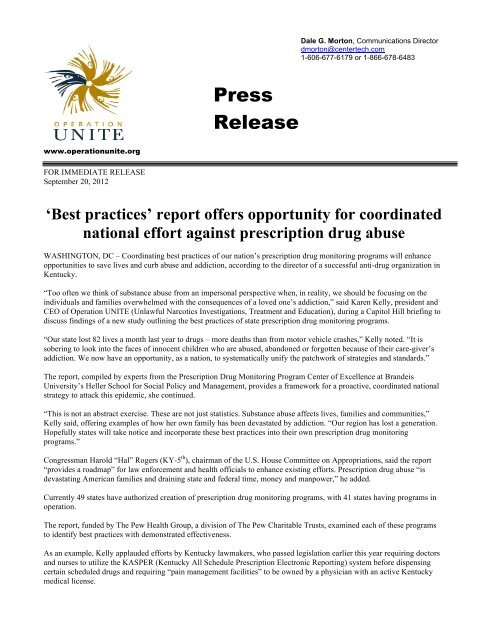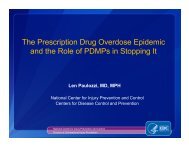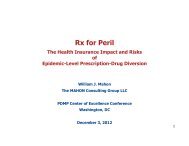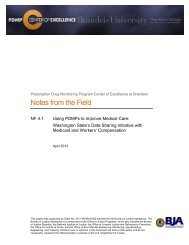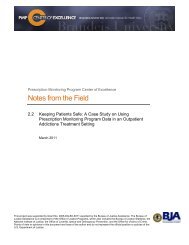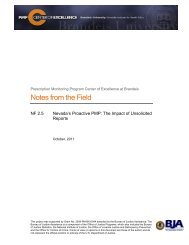Press Release by Operation Unite - PDMP Center of Excellence
Press Release by Operation Unite - PDMP Center of Excellence
Press Release by Operation Unite - PDMP Center of Excellence
You also want an ePaper? Increase the reach of your titles
YUMPU automatically turns print PDFs into web optimized ePapers that Google loves.
Dale G. Morton, Communications Director<br />
dmorton@centertech.com<br />
1-606-677-6179 or 1-866-678-6483<br />
<strong>Press</strong><br />
<strong>Release</strong><br />
www.operationunite.org<br />
FOR IMMEDIATE RELEASE<br />
September 20, 2012<br />
‘Best practices’ report <strong>of</strong>fers opportunity for coordinated<br />
national effort against prescription drug abuse<br />
WASHINGTON, DC – Coordinating best practices <strong>of</strong> our nation’s prescription drug monitoring programs will enhance<br />
opportunities to save lives and curb abuse and addiction, according to the director <strong>of</strong> a successful anti-drug organization in<br />
Kentucky.<br />
“Too <strong>of</strong>ten we think <strong>of</strong> substance abuse from an impersonal perspective when, in reality, we should be focusing on the<br />
individuals and families overwhelmed with the consequences <strong>of</strong> a loved one’s addiction,” said Karen Kelly, president and<br />
CEO <strong>of</strong> <strong>Operation</strong> UNITE (Unlawful Narcotics Investigations, Treatment and Education), during a Capitol Hill briefing to<br />
discuss findings <strong>of</strong> a new study outlining the best practices <strong>of</strong> state prescription drug monitoring programs.<br />
“Our state lost 82 lives a month last year to drugs – more deaths than from motor vehicle crashes,” Kelly noted. “It is<br />
sobering to look into the faces <strong>of</strong> innocent children who are abused, abandoned or forgotten because <strong>of</strong> their care-giver’s<br />
addiction. We now have an opportunity, as a nation, to systematically unify the patchwork <strong>of</strong> strategies and standards.”<br />
The report, compiled <strong>by</strong> experts from the Prescription Drug Monitoring Program <strong>Center</strong> <strong>of</strong> <strong>Excellence</strong> at Brandeis<br />
University’s Heller School for Social Policy and Management, provides a framework for a proactive, coordinated national<br />
strategy to attack this epidemic, she continued.<br />
“This is not an abstract exercise. These are not just statistics. Substance abuse affects lives, families and communities,”<br />
Kelly said, <strong>of</strong>fering examples <strong>of</strong> how her own family has been devastated <strong>by</strong> addiction. “Our region has lost a generation.<br />
Hopefully states will take notice and incorporate these best practices into their own prescription drug monitoring<br />
programs.”<br />
Congressman Harold “Hal” Rogers (KY-5 th ), chairman <strong>of</strong> the U.S. House Committee on Appropriations, said the report<br />
“provides a roadmap” for law enforcement and health <strong>of</strong>ficials to enhance existing efforts. Prescription drug abuse “is<br />
devastating American families and draining state and federal time, money and manpower,” he added.<br />
Currently 49 states have authorized creation <strong>of</strong> prescription drug monitoring programs, with 41 states having programs in<br />
operation.<br />
The report, funded <strong>by</strong> The Pew Health Group, a division <strong>of</strong> The Pew Charitable Trusts, examined each <strong>of</strong> these programs<br />
to identify best practices with demonstrated effectiveness.<br />
As an example, Kelly applauded efforts <strong>by</strong> Kentucky lawmakers, who passed legislation earlier this year requiring doctors<br />
and nurses to utilize the KASPER (Kentucky All Schedule Prescription Electronic Reporting) system before dispensing<br />
certain scheduled drugs and requiring “pain management facilities” to be owned <strong>by</strong> a physician with an active Kentucky<br />
medical license.
“Since that law took effect a few months ago the state has already pulled licenses <strong>of</strong> several ‘pill mill’ operators,” she<br />
noted. “This legislation is already saving lives.”<br />
For more information about <strong>Operation</strong> UNITE visit their website at www.operationunite.org.<br />
* * * * *<br />
In 2003, Fifth District Congressman Harold “Hal” Rogers (R-Somerset) worked to create <strong>Operation</strong> UNITE, a regional anti-drug initiative empowering<br />
citizens groups and community leaders in 29 southern and eastern Kentucky counties. UNITE, which stands for Unlawful Narcotics Investigations,<br />
Treatment & Education, seeks to fight the drug epidemic <strong>by</strong> expanding drug awareness and education programs to keep people from using drugs;<br />
coordinating drug treatment and outreach programs for those who are already addicted; and operating regional undercover law enforcement task forces for<br />
interdiction and prosecution <strong>of</strong> those dealing drugs. For more information contact Karen Kelly toll-free at 1-866-678-6483.<br />
Drug Tip Hotline – 1-866-424-4382 / Treatment Referral Line – 1-866-90-UNITE (1-866-908-6483)


